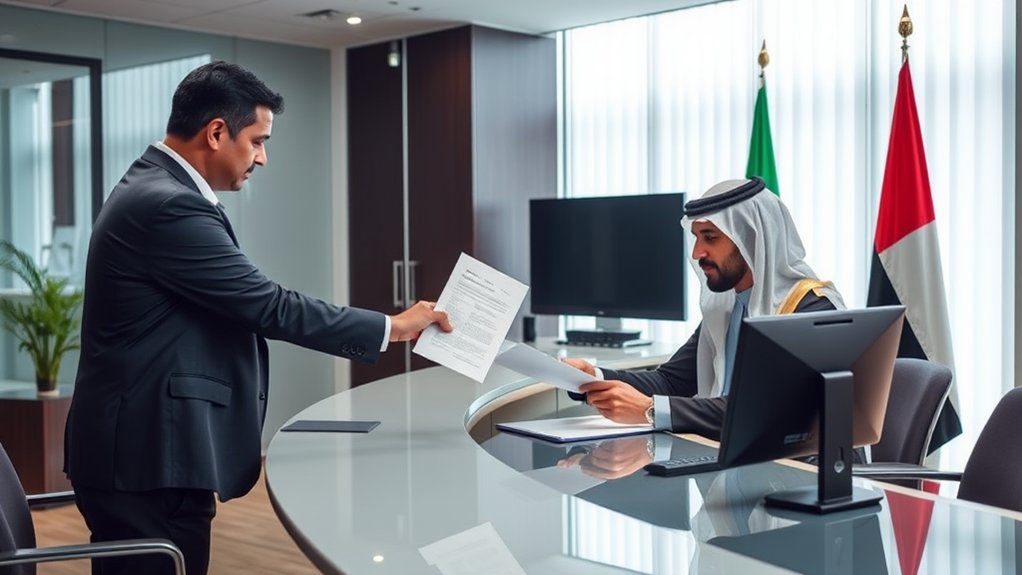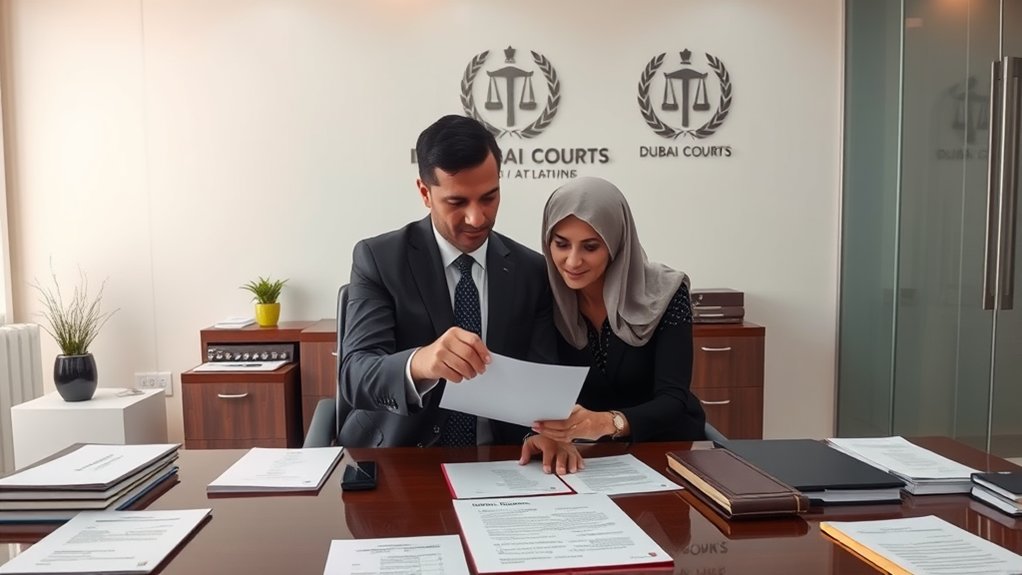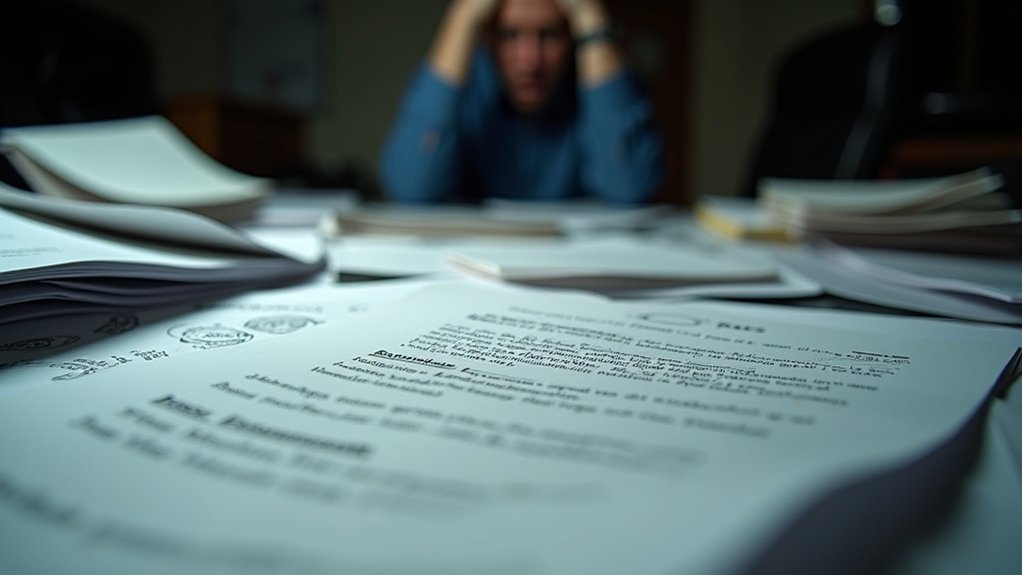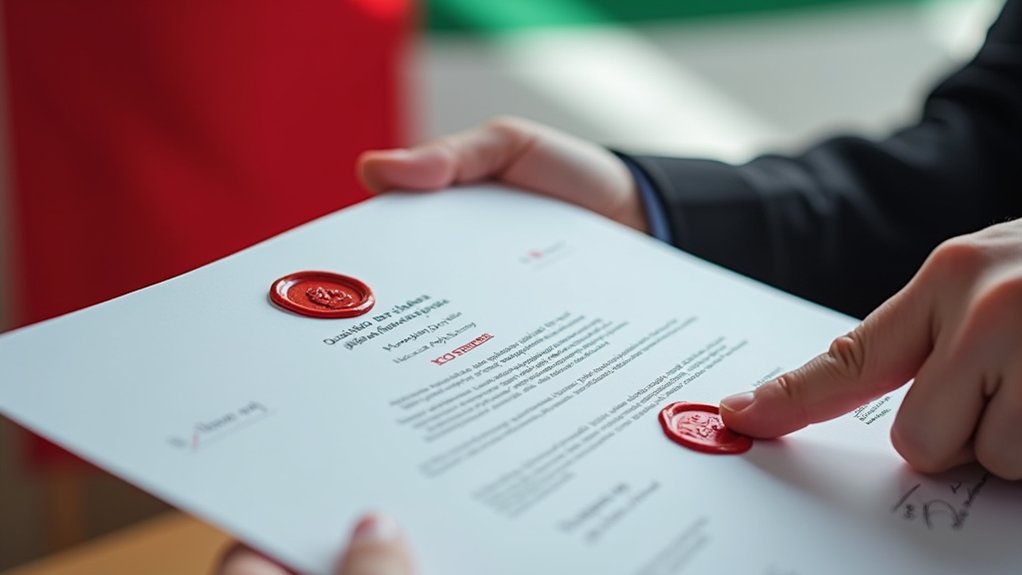To get a Power of Attorney attested by Dubai Courts, you must first verify the document is notarized by a Notary Public in adherence to UAE Federal Law No. 5 of 1985. Gather all required documents, including the original POA and identification for both the principal and agent, along with any necessary company documentation. Engage services like Tasheel for a streamlined process. You'll then attend a virtual meeting to finalize the notarization. This procedure not only legitimizes your POA but also facilitates compliance with local regulations, thereby enhancing your operational efficiency. Further guidance on this process awaits.
Understanding Power of Attorney

When you consider the power of attorney (POA), it's important to understand that this legal document enables you to authorize someone else to act on your behalf in various matters. This authority can encompass personal, financial, and legal decisions, allowing your chosen agent to represent your interests effectively. In the UAE, attestation is essential for the validity of the POA, requiring notarization, potential translation into Arabic, and certification by relevant government bodies. You must be at least 21 and mentally competent to grant this power, which can be specifically tailored for distinct tasks or general authority. Understanding these critical elements guarantees that your legal document functions as intended, safeguarding your interests in diverse scenarios.
Types of Powers of Attorney
Understanding the various types of powers of attorney (POA) helps you choose the right one for your needs. Here are the primary types of powers:
- General Power of Attorney: Grants broad authority to manage personal, financial, legal, and business matters.
- Special Power of Attorney: Provides limited authority, tailored for specific tasks or actions within defined parameters.
- Company Power of Attorney: Enables an individual to represent a company, facilitating business operations and dealings with governmental entities.
- Property Power of Attorney: Authorizes an agent to manage transactions related to specific properties, guaranteeing effective property management.
Each type of power offers unique legal authorization and authority to act, so make sure you understand the required documents before proceeding.
Legal Requirements in Dubai

To guarantee your Power of Attorney (POA) is legally recognized in Dubai, it must undergo a specific attestation process. First, your power of attorney must be notarized by Notary Publics in Dubai, ensuring all legal documents comply with UAE Federal Law No. 5 of 1985. This is essential, as only those POAs meeting these requirements are accepted for attestation by Dubai Courts. During this process, you'll need to present valid identification, such as your Emirates ID or passport. Additionally, be prepared to provide proof of residence and the purpose of the POA, as these may be requested by the courts. Following these guidelines will facilitate a smoother attestation experience, aligning with the UAE Ministry of Justice's mandates.
Required Documents for Attestation
Attesting a Power of Attorney (POA) in Dubai requires specific documents to guarantee a smooth process. To facilitate the attestation, you'll need to gather the following required documents:
- Original POA Document: Make certain you have the original along with photocopies for verification.
- Identification: Valid Emirates IDs or passports are mandatory for both the principal and the agent involved in the POA.
- Company Documents: Include the commercial license and the memorandum of association, either in Arabic or as a certified translation.
- Proof of Residence: This may be required to establish the legitimacy of the involved parties.
Attestation Procedure Overview

Before you can use a Power of Attorney (POA) in Dubai, you'll need to follow a series of steps for attestation. Initially, the legal document that allows you to delegate authority must be signed before a notary public in your home country. Following this, you'll obtain attestation from the Ministry of Foreign Affairs in that country. Once the POA is attested abroad, it must be certified by the UAE Embassy or Consulate to gain recognition in the UAE. Upon arrival in the UAE, the power of attorney remains valid only after being stamped by the UAE Ministry of Foreign Affairs. If the document is in a foreign language, make certain it's translated into Arabic by authorized translators before submission for the attestation procedure at Dubai Courts.
Online Process for Company POA
How can companies streamline the process of obtaining a Power of Attorney (POA) in Dubai? By utilizing the online process, you can efficiently manage this essential task. Here's how:
- Prepare Required Documents: Gather your commercial license, memorandum of association, Emirates IDs of both the principal and agent, and a draft of the POA.
- Submit Electronically: Upload all documents through the designated online platform.
- Schedule a Virtual Meeting: Arrange a meeting with a notary public to facilitate the necessary notarization.
- Receive Your POA: Following document submission and the virtual meeting, expect to receive your Power of Attorney within 24 hours.
This seamless online approach eliminates the need for in-person visits, ensuring compliance while saving time and resources.
Common Uses of POA

In Dubai, Power of Attorney (POA) serves critical functions in real estate transactions and the management of business operations. By granting authority to designated agents, you can streamline property dealings, ensuring effective buying, selling, or leasing without direct involvement. Additionally, POA empowers your chosen representatives to oversee daily business activities, enhancing operational efficiency and allowing you to focus on strategic growth. Moreover, utilizing a POA can simplify the process of obtaining necessary business licenses and ensuring compliance with local regulations.
Real Estate Transactions
When engaging in real estate transactions, using a Power of Attorney (POA) can simplify the process considerably. This legal tool allows you, the principal, to designate an agent to handle various property matters, ensuring efficiency and compliance. Here are some common uses of a POA in real estate:
- Authorize transactions: Empower your agent to buy, sell, or lease properties on your behalf.
- Facilitate title transfers: Streamline the process of transferring ownership.
- Manage rental agreements: Enable your agent to negotiate terms and collect rents.
- Retain flexibility: Modify or revoke the POA as needed, ensuring it aligns with your evolving needs.
Business Operations Management
Using a Power of Attorney (POA) isn't just limited to real estate; it plays an essential role in managing business operations as well. Companies often utilize a POA to delegate authority to manage daily tasks, ensuring efficient handling of legal matters and administrative responsibilities. Common applications include managing bank accounts, representing the company in dealings with government entities, and overseeing payroll and employee matters. By issuing a Business Management POA, you authorize an agent to handle contracts, negotiations, and other crucial transactions on your behalf. This delegation not only maintains productivity but also safeguards decision-making capabilities, even in the absence of key personnel. Ultimately, a POA is indispensable for streamlining business operations and ensuring continuity, especially when utilizing PRO services that simplify the complexities of regulatory compliance.
Best Practices for POA
When establishing a Power of Attorney (POA), it's essential that you define the terms of authority clearly to avoid any potential disputes regarding the agent's role. Consulting with legal professionals can help you navigate complex situations and guarantee compliance with UAE laws, particularly when considering the revocation process and its documentation. By adhering to these best practices, you can strengthen the integrity of your POA and safeguard your interests.
Clear Authority Definition
Establishing clear authority in a Power of Attorney (POA) is essential for ensuring effective representation and minimizing disputes. A clear authority definition involves explicitly outlining the agent's powers, ensuring they align with your company's specific needs. To achieve this, consider the following best practices:
- Clearly define the specific tasks the attorney is issued.
- Tailor the scope of authority to include limitations or conditions.
- Specify the duration of the POA, indicating whether it's temporary or permanent.
- Include a revocation clause to clarify how and when the attorney's authority can be terminated.
Document Revocation Process
Revoking a Power of Attorney (POA) is an essential step that can prevent unauthorized actions and protect your interests. To initiate the revocation process, the principal must issue a written notice of revocation to the agent, ensuring it is documented and dated for clarity. It's vital to inform any third parties reliant on the POA about its revocation, thereby preventing potential misuse by the agent. This process should be formally executed, often requiring notarization, particularly if the original POA was notarized, to uphold legal integrity. Additionally, maintain a clear record of the revocation, including copies of the notice and responses received. If the POA was registered, formal registration of the revocation is also necessary to update official records.
Legal Consultation Importance
Engaging a legal professional before drafting a Power of Attorney (POA) is a smart move that helps guarantee your document aligns with UAE laws and accurately captures your intentions. Here are some best practices for legal consultation:
- Ensure Compliance: Legal experts help your POA meet UAE legal requirements, reducing future disputes.
- Clarify Scope: A lawyer can tailor the authority granted, aligning it with your company's operational needs.
- Understand Responsibilities: Legal advice elucidates the implications of granting POA, protecting your company's interests.
- Facilitate Attestation: Professionals identify potential issues in the attestation process, ensuring smooth interactions with Dubai Courts.
Additionally, consultants can provide expert guidance for establishing businesses, ensuring that your POA meets all necessary criteria for effective use in the UAE.
Investing in legal consultation is essential for safeguarding your company's interests and ensuring a robust, effective Power of Attorney.
Assistance and Contact Information

Need help with the power of attorney attestation process in Dubai? You can rely on Tasheel for efficient assistance with your legal needs. They facilitate the notarization and legalization of documents online, often within an hour. To initiate the process, make certain you have the original Power of Attorney and identity documents for both the principal and agent. Additionally, you may need to attend a virtual meeting via Zoom or Botim with the notary for finalization. If you have any inquiries, don't hesitate to contact us via WhatsApp or phone, or reach out through email at info@tasheellegal.com for detailed support. Trust Tasheel to navigate the complexities of the Dubai Courts effectively, ensuring a smooth attestation process.
Frequently Asked Questions
How Do I Attest Power of Attorney in Dubai?
To attest a Power of Attorney in Dubai, you'll need to meet legal requirements, prepare your documents, utilize notary services, and follow court procedures for proper validation and recognition within the UAE.
Where to Get Power of Attorney in the UAE?
You can obtain a Power of Attorney in the UAE through a notary public. Verify you meet the document requirements, complete the notarization process, and comply with UAE regulations for effective legal representation.
How Much Does It Cost to Get Power of Attorney in the UAE?
When considering a Power of Attorney in the UAE, remember cost factors like legal fees, notary services, and document requirements. Processing times can vary, so plan accordingly to avoid unexpected expenses during your journey.
How Long Does POA Take in Dubai?
The duration for a Power of Attorney in Dubai varies based on processing times, legal requirements, and documentation checklist. Expedited services can shorten your wait, but factors like complexity may extend the overall timeframe.
Conclusion
In conclusion, steering through the attestation of a Power of Attorney in Dubai requires an understanding of legal requirements and a meticulous approach to documentation. By adhering to established procedures and leveraging both traditional and online resources, companies can guarantee their POA is valid and enforceable. Just as a knight wields a sword with precision, so too must you approach this process with care and diligence, paving the way for seamless business operations in a complex legal landscape.





